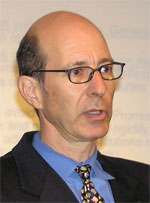Read More »
Palley en el quisco
Verano 2017
Read More »Palley 3D
Entel las condes
Read More »Obamacare With a Public Option: Fool Me Twice Shame on Me
There is an old saying “Fool me once shame on you, fool me twice shame on me.” That saying is relevant for the current healthcare debate in which former Vice-President Biden and elite Democrats are touting a reheated version of Obamacare with a public option. It is a case of trying to fool the American […]
Read More »Bernie Sanders: Nothing to Fear Except Fear Itself
“The only thing we have to fear is fear itself.” Eighty-seven years ago those were the words of Franklin Delano Roosevelt in his 1933 inaugural speech. Today, they resonate with Senator Bernie Sanders’ presidential campaign, which confronts a barrage of attack aimed at frightening away voters. Fear is the enemy of change and the friend […]
Read More »Do current times vindicate Keynes and is New Keynesian macroeconomics Keynesian?
Thomas I. Palley, Esteban Pérez Caldentey, and Matias Vernengo, Review of Keynesian Economics, January 2020. Professor Robert Rowthorn delivered the second annual Godley-Tobin lecture in New York City on March 1, 2019. The title of his lecture was “Keynesian economics: back from the dead?” and it is published in this issue of the Review of […]
Read More »A Stock Market Boom is Not the Basis of Shared Prosperity
The US is currently enjoying another stock market boom which, if history is any guide, also stands to end in a bust. In the meantime, the boom is having a politically toxic effect by lending support to Donald Trump and obscuring the case for reversing the neoliberal economic paradigm. For four decades the US economy […]
Read More »The economics of negative interest rates: editors’ introduction
Thomas Palley, Louis-Philippe Rochon, Guillaume Vallet , Review of Keynesian Economics, April 2019. The Great Recession (2008/9) triggered by the financial crisis of 2008 has had considerable impact on the conduct of monetary policy. Before the recession, monetary policy was largely based on a New Consensus-type macroeconomic model and it targeted inflation via a Taylor […]
Read More »A Conservative win will create a neoliberal hot zone and dissolve the UK: here’s how to stop it
I could not get this op-ed (written November 6, 2019) published as it was a mix of too dull & didactic, and too partisan or not partisan enough. Anyway, in the wake of the election, I think it was analytically spot on so I have decided to post it. Also, it makes clear the very […]
Read More »Ab to pe gya punjabiya di palley
Video from Neelam
Read More » Thomas Palley: Economics for Democratic and Open Societies
Thomas Palley: Economics for Democratic and Open Societies




